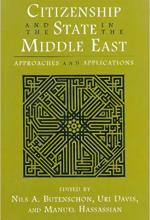This edited volume (one of a two-volume set) is the product of a five-year project in which numerous academics from a variety of disciplines, institutions, and countries cooperated on a shared interest in citizenship and democratization in the Middle East. It is a work that contains both theoretical discussions and empirical studies, although not necessarily along the lines suggested by the book's division into two parts: "Approaches" and "Applications."
"Approaches" begins with several chapters setting out different ways of conceptualizing the construction and practice of citizenship in the Middle East. Editor Nils Butenschon begins by identifying citizenship as key to understanding the distribution of power and the nature of political institutions in a given state. He then develops two typologies of elements of citizenship: one that categorizes the principles of distributions of rights, and a second that sorts states according to constitutional and territorial principles (pp.17-18). Bryan Turner's chapter seeks to explain the absence or underdevelopment of democratic citizenship. Most of his discussion serves to underpin a three-dimensional typology of citizenship, according to whether the citizenship is active or passive, whether public life is viewed by society as having a moral quality, and whether membership in the community of citizens is according to particularistic or universal notions.
While both of these contributions are provocative and rich, and many of the questions they raise are found in subsequent chapters, there is no evidence of a self-conscious attempt to link the later contributions with them, a common problem with edited volumes. That said, this work is held together by the utility and quality of the majority of the studies.
Uri Davis, in his first contribution, highlights the critical distinction between passport citizenship (jinsiyya) and democratic citizenship (muwatana). Less convincing is his reduction in his second chapter of the definition of sovereignty to solely whether a political entity has an army and control of frontiers, particularly given the degree to which increasing economic and political interdependence globally has impinged upon what it means to be truly sovereign. In his defense, Davis's definition seems targeted specifically at the notion that an Oslo-midwifed Palestinian entity could ever be truly sovereign.
Several other studies deserve mention. Rania Maktabi's chapter on Lebanon discusses in detail the centrality of the 1932 census to continuing problematic notions of citizenship in Lebanon. She specifically criticizes Arend Lijphart's famous description of the Lebanese political system as that of a consociational democracy on the grounds that he failed to address the principles on which power sharing was built--discrimination and marginalization. Raymond Hinnebusch's piece on Syria and Egypt is an indictment of the ambivalence of the Middle Eastern middle classes toward democracy. Anh Nga Longva's study of Kuwait focuses on the respective political and economic roles of hadar and bedu and the implications these roles have had for the respective group's differing understandings of citizenship.
Fully half of the book, the entire section entitled "Applications," is devoted to citizenship in the Palestine/Israel arena. Here, Anis Qasim provides a useful overview of the history of the complex and varied citizenship (and stateless) conditions in which Palestinians have found themselves. Manuel Hassassian's chapter attempts to make the case that Palestinian society has "a more democratic posture than other Arab societies" (p. 251), yet he is insufficiently critical of the Palestinian Authority (PA) and resorts to essentialist generalizations about Arab society being incapable of adopting Western concepts of citizenship. Rebecca Kook's chapter is an overview of some of the many ways in which "ethnonational structures of inequality have been defined into the institution of citizenship" in Israel (p. 264), while Beverly Milton-Edwards provides a detailed examination of the funding, development, and abuses of the various institutions of coercion/law enforcement run by the PA. Sara Helman's examination of individual conceptions of citizenship through studying conscientious objectors in Israel is also quite revealing.
However, among the Palestine/Israel contributions, two stand out, theoretically and empirically. Zeev Rosenhek and Michael Shalev, while taking the context of Zionism as guiding ideology for granted, nonetheless show how little predictive power it has in terms of specific policies. By examining various instances of Israeli state welfare policy, they make clear how historically and institutionally contingent outcomes are. Christopher Parker, on the other hand, shows how the "autonomy" that has developed in the West Bank and Gaza since 1994 has been of so bastardized a nature that the PA has very few of the powers usually invoked to co-opt the population to a state-building project. As a result, it has resorted to manipulative sloganeering, coercion, and traditional patrimonialism (p. 383), hardly the bases for engendering democratic citizenship.
Before concluding, it is worth noting that there is one chapter in "Approaches" on gender (Mary Ann Tetrault), yet gender receives almost no attention elsewhere in the book. While this is unfortunate, it does encourage one to obtain the companion volume, Gender and Citizenship in the Middle East, edited by Suad Joseph (Syracuse University Press, 2000). If it is anything like this volume, it will make for important reading.
----------------
Laurie A. Brand, professor of international relations at the University of Southern California, is the author of Women, The State and Political Liberalization: Middle Eastern and North African Experiences (Columbia University Press, 1998).
